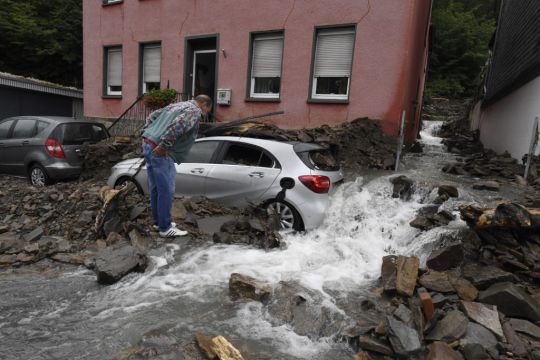More than 60 people have died and dozens of people are missing in Germany and neighbouring Belgium after heavy flooding turned streams and streets into raging torrents, sweeping away cars and causing buildings to collapse.
Storms across parts of western Europe in recent days caused rivers and reservoirs to burst their banks, resulting in several flash floods overnight as rain-soaked soil failed to absorb any more water.
“I grieve for those who have lost their lives in this disaster,” German Chancellor Angela Merkel said during a visit to Washington, expressing shock at the scope of the flooding. “We still don’t know the number. But it will be many.”
She pledged everything would be done to find those still missing, adding: “’Heavy rain and flooding’ doesn’t capture what happened.”
Authorities in North Rhine-Westphalia state said at least 30 people have died while 28 deaths were reported in Rhineland-Palatinate state to the south.
Belgian media reported eight deaths in the country.
Among the worst-hit German villages was Schuld, where several homes collapsed and dozens of people remained unaccounted for.
Rescue operations were hampered by blocked roads and phone and internet outages across the Eifel, a volcanic region of rolling hills and small valleys.
Some villages were reduced to rubble as old brick and timber houses could not withstand the sudden rush of water, often carrying trees and other debris as it gushed through narrow streets.
Karl-Heinz Grimm, who had come to help his parents in Schuld, said he had never seen the small Ahr River surge in such a deadly torrent.
“This night, it was like madness,” he said.
Dozens of people had to be rescued from the roofs of their houses with inflatable boats and helicopters. Hundreds of soldiers were deployed to assist in the rescue efforts.
“There are people dead, there are people missing, there are many who are still in danger,” the governor of Rhineland-Palatinate state, Malu Dreyer, told the regional parliament.
“We have never seen such a disaster. It’s really devastating.”

Across the border in Belgium, the Vesdre river broke its banks and sent masses of water churning through the streets of Pepinster, close to Liege, its destructive power bringing down some buildings.
“Several homes have collapsed,” mayor Philippe Godin told RTBF network. It was unclear whether all inhabitants had been able to escape unhurt.
Major highways were inundated in the south and east of Belgium, and the railway service said all traffic was stopped.
EU Commission President Ursula von der Leyen pledged to help those affected.
“My thoughts are with the families of the victims of the devastating floods in Belgium, Germany, Luxembourg and the Netherlands and those who have lost their homes,” she tweeted.
“The EU is ready to help.”

The full extent of the damage across the region was still unclear after many villages were cut off by floodwater and landslides that made roads impassable. Videos posted on social media showed cars floating down streets and houses partly collapsed in some places.
Many of the dead were discovered after floodwaters began to recede again.
Police said four people died in separate incidents after their basements were flooded in Cologne, Kamen and Wuppertal, where authorities warned that a dam threatened to burst.
Authorities in the Rhine-Sieg county south of Cologne ordered the evacuation of several villages below the Steinbachtal reservoir amid fears the dam there could also break.
Two firefighters died during rescue operations in North-Rhine Westphalia, Germany’s most populous state.
Governor Armin Laschet paid tribute to them and pledged swift help for those individuals and businesses affected by the floods.

“We don’t know the extent of the damage yet, but we won’t leave the communities, the people affected alone,” he said during a visit to the flood-hit city of Hagen.
German weather service DWD predicted the rainfall would ease on Thursday, although there might still be localised storms and water levels on the Mosel and Rhine rivers would continue to rise in the coming hours.
Authorities in the southern Dutch town of Valkenburg, close to the German and Belgian borders, evacuated a care home and a hospice overnight amid flooding that turned the tourist town’s main street into a river, Dutch media reported.
The Dutch government sent some 70 troops to the southern province of Limburg late on Wednesday to help with transporting evacuees and filling sandbags as rivers burst their banks. And a section of one of the Netherlands’ busiest highways was closed due to rising floodwaters threatening to inundate the road.
Unusually intense rains have also inundated a swathe of northeast France this week, downing trees and forcing the closure of dozens of roads. A train route to Luxembourg was disrupted, and firefighters evacuated dozens of people from homes near the Luxembourg and German border and in the Marne region, according to local broadcaster France Bleu.
The equivalent of two months of rain has fallen on some areas in the last day or two, according to the French national weather service. With the ground already saturated, the service forecast more downpours on Thursday and issued flood warnings for 10 regions.

Meanwhile, high temperatures of 30C (86F) or higher were expected on Thursday in parts of northern Europe.
Overnight between Wednesday and Thursday was the hottest in history, the Finnish weather service company Foreca said, with the mercury reaching 24.2C (75.6F).
Greta Thunberg, the climate activist, tweeted that the extreme weather of recent days should not be regarded as “the new normal”.
“We’re at the very beginning of a climate and ecological emergency, and extreme weather events will only become more and more frequent,” she wrote.







